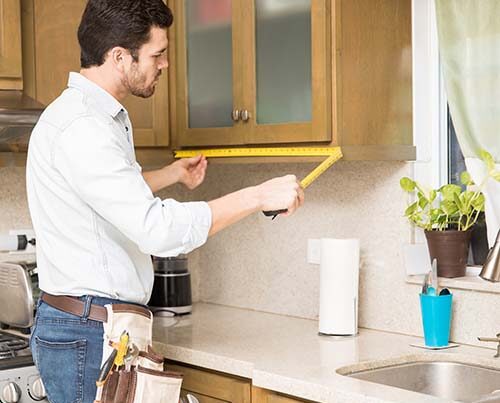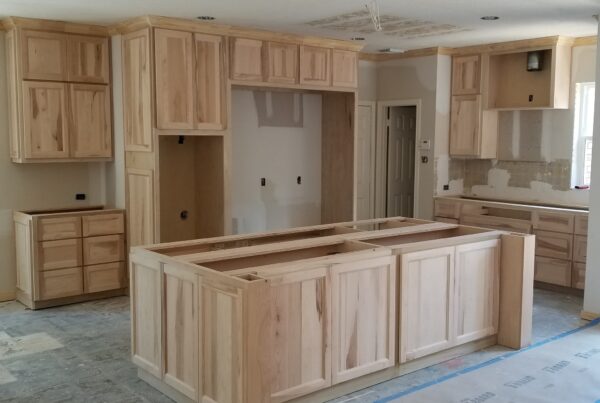Effective budget discussions are key to a successful kitchen remodel. Here’s how to navigate these conversations to ensure you and your kitchen contractor are on the same page.
How To Discuss Budget & Pricing For Your Kitchen Renovation
One of the first and most important steps is to be upfront about your budget from the start. This clarity helps prevent misunderstandings and ensures that you and your kitchen contractor are aligned.
Determine Your Budget Range
Before meeting with contractors, establish a clear budget range. Knowing your financial limits will help you communicate your needs more effectively and allow the contractor to provide realistic solutions.
Discuss Top Budget Range
Clearly communicate your top budget range to the contractor. This transparency can prevent wasted time if the contractor’s services are outside your financial limits. It also helps the contractor propose solutions that fit within your budget.
Break Down the Budget
Ask the contractor to break down the budget into specific categories, such as labor, materials, permits, and contingencies. This detailed breakdown provides a clearer understanding of where your money is going and helps you identify areas where you might be able to save.
Get Multiple Quotes
Obtaining quotes from multiple contractors is essential for comparing costs and services. Here’s how to make the most of this process:
Request Detailed Quotes
Ensure each contractor provides a detailed quote that includes all aspects of the project. This transparency allows you to compare quotes accurately and understand the cost differences.
Compare and Contrast Estimates
Don’t just look at the total cost. Compare the breakdowns to see where contractors might be charging more or less. This can help you identify potential savings or areas where higher costs might indicate better quality.
Discuss Any Discrepancies
If you notice significant discrepancies between quotes, discuss them with the contractors. Understanding the reasons behind these differences can help you make a more informed decision.
Understand Payment Schedules
Agreeing on a fair and manageable payment schedule is crucial for both you and your contractor. Here’s how to set it up:
Milestone-Based Payments
Structure payments based on project milestones rather than time intervals. This ensures that you only pay for completed work and helps motivate the contractor to stay on schedule.
Initial Deposit
Discuss the initial deposit amount. While a deposit is standard, it should be reasonable and typically not exceed 50% of the total project cost. This balance protects both parties.
Final Payment
Ensure the final payment is contingent on the completion of the project and your satisfaction with the work. This gives the contractor an incentive to finish the job to your standards.
Addressing Changes and Unexpected Costs
Changes and unexpected costs are common in remodeling projects. Here’s how to handle them:
Change Order Process
Establish a clear process for handling change orders. Any changes to the project scope should be documented in writing and include detailed cost adjustments. This process helps prevent misunderstandings and keeps both parties accountable.
Contingency Fund
Set aside a contingency fund to cover unexpected costs. A good rule of thumb is to allocate 10-20% of your total budget for contingencies. This buffer helps you manage surprises without derailing the project.
Transparent Communication
Encourage open and transparent communication about any potential changes or issues. Addressing these promptly can help minimize their impact on the budget.
Negotiation Tips
Negotiation is a natural part of the remodeling process. Here’s how to approach it effectively:
Know Your Priorities
Understand what aspects of the project are most important to you. This knowledge helps you negotiate more effectively and make trade-offs where necessary.
Ask for Value-Added Services
If a contractor’s quote is slightly higher than others, consider asking for value-added services rather than a price reduction. This could include upgrades in materials, extended warranties, or additional work.
Be Respectful and Realistic
Approach negotiations respectfully and realistically. Understand that contractors need to make a fair profit, and lowballing can harm the relationship. Aim for a fair deal that benefits both parties.
By following these tips, you can ensure clear, effective budget discussions with your kitchen contractor, leading to a successful and stress-free kitchen remodel.
Make TruCustom Cabinets Your Kitchen Remodel Contractor
With over 90 years of combined experience and hundreds of satisfied clients, we are ready to assist you with your kitchen renovation project. To learn more about TruCustom Cabinets’ solutions for your kitchen call us at (281) 524-6144 to get started.
Let’s build something amazing together.
Need a free kitchen remodel estimate?
Want to talk to one of our experts?
Request a custom estimate for your kitchen renovation project.







